President Donald Trump railed against the Paris climate accord on Sunday, telling world leaders at a virtual summit that the agreement was designed to cripple the U.S. economy, not save the planet.
“To protect American workers, I withdrew the United States from the unfair and one-sided Paris climate accord, a very unfair act for the United States,” Trump said in a video statement from the White House to the Group of 20 summit hosted by Saudi Arabia. His comments came during a discussion among the world's largest economies on safeguarding the Earth.
President-elect Joe Biden, who takes office in January, has said he will rejoin the global pact that the U.S. helped forge five years ago.
Trump contended the international accord was “not designed to save the environment. It was designed to kill the American economy."
Trump, who has worked to undo most of President Barack Obama’s efforts to fight climate change, said that since withdrawing from the climate agreement, the U.S. has reduced carbon emissions more than any nation.
That is true, but not that remarkable. With its giant economy, the U.S. has far more raw emissions of climate-damaging carbon dioxide to cut than any other country except China.
A more telling measure of progress in various countries is to look at what percentage of emissions a county has cut. Since 2005, the United States hasn’t been even in the top 10 in percentage of greenhouse gas emission reductions.
More than 180 nations have ratified the accord, which aims to keep the increase in average temperatures worldwide “well below” 2 degrees Celsius (3.6 degrees Fahrenheit) and ideally no more than 1.5C (2.7 F), compared with pre-industrial levels. Scientists say that any rise beyond 2 degrees Celsius could have a devastating impact on large parts of the world, raising sea levels, stoking tropical storms and worsening droughts and floods.
The U.S. formally exited the Paris pact on Nov. 4. On Saturday, the U.S. formally left the Open Skies Treaty, which permits 30-plus nations to conduct unarmed, observation flights over each other’s territory. Those overflights were set up decades ago to promote trust and avert conflict.
The administration said it wanted out of the treaty because Russia was violating the pact, and imagery collected during the flights can be obtained quickly at less cost from U.S. or commercial satellites.
During the discussions at the climate session, President Xi Jinping of China, the world's largest emitter, said the G-20 should continue to take the lead in tackling climate change and push for the full implementation of the Paris accord.
“Not long ago, I announced China’s initiative to scale up its nationally determined contributions and strive to peak carbon dioxide emissions by 2030 and achieve carbon neutrality by 2060,” he said. “China will honor its commitment and see the implementation through.”
India's prime minister, Narendra Modi, said “climate change must be fought not in silos, but in an integrated, comprehensive and holistic way.”
VILLA MADERO, Mexico (AP) — As a drought in Mexico drags on, angry subsistence farmers have begun taking direct action on thirsty avocado orchards and berry fields of commercial farms that are drying up streams in the mountains west of Mexico City.
Rivers and even whole lakes are disappearing in the once green and lush state of Michoacan, as the drought combines with a surge in the use of water for the country’s lucrative export crops, led by avocados.
In recent days, subsistence farmers and activists from the Michoacan town of Villa Madero organized teams to go into the mountains and rip out illegal water pumps and breach unlicensed irrigation holding ponds.
A potential conflict looms with avocado growers — who are often sponsored by, or pay protection money to, drug cartels.
Last week, dozens of residents, farmworkers and small-scale farmers from Villa Madero hiked up into the hills to tear out irrigation equipment using mountain springs to water avocado orchards carved out of the pine-covered hills.
The week before, another group went up with picks and shovels and breached the walls of an illegal containment pond that sucked up water from a spring that had supplied local residents for hundreds of years.
“In the last 10 years, the streams, the springs, the rivers have been drying up and the water has been captured, mainly to be used for avocados and berries,” said local activist Julio Santoyo, one of the organizers of the effort. “There are hamlets in the lower part of the township that no longer have water.”
Santoyo estimated that about 850 of the plastic-lined, earthen containment ponds have sprung up in the hills around Villa Madero, usually soon after planters have illegally logged or burned the native pine forest. Pines help the soil retain water, while avocado trees deplete it.
Francisco Gómez Cortés said residents of his hamlet, El Sauz, had been asking the landowner for 15 years to allow the spring to flow downhill to their community.
After a year in which Mexico received only about half its normal rainfall, residents became desperate, and last week they worked up the courage to hike up the hill and rip out pumps and hoses for the avocado orchard.
“We don't have enough water for human consumption,” Gómez Cortés said.
“It’s sad. It’s sad to walk down these trails that are now dry, when they once had trees and springs,” he said. “They haven’t even left any water for the (forest) animals that nest along the banks.”
In a sign of how seriously the local government is taking the potential threat, the group was accompanied by the mayor of Villa Madero, who blamed outsiders for the problem.
“There are people who aren't from this town, who come to our township and are invading us,” Mayor Froylan Alcauter Ibarra said. “They are taking water away from the people who live downhill, and they don't realize these are the poorest people.”
Residents say they don't want to deny water entirely to the orchards and have proposed an agreement to give landowners 20% of the water from local streams, if they allow the remaining 80% to keep flowing. They say they haven't gotten any response yet.
Drug cartels often make money from illegal logging and extorting money from avocado growers in Michoacan. The activists around Villa Madero have suffered threats, kidnappings and beatings in the past.
“We are running a serious risk of them killing us for protesting,” Gómez Cortés said. “Out of necessity, we are doing what the government should be doing.”
The government has long done little to limit the growers and combat deforestation and water takeovers. But it does seem to have developed a sudden interest in preventing the looming conflict.
In March, activists organized a meeting nearby at Patzcuaro Lake to demand authorities do something about the fast-declining water levels. Patzcuaro is a shallow but extensive lake in Michoacan with a beautiful colonial town on its shores and an island of fishermen perched in the middle.
The fishermen of Janitzio island with their shallow boats and hooped, figure-eight nets were made famous by photographers and filmmakers in the 1940s and 50s as a symbol of Mexico's folk traditions. The town of Patzcuaro draws hundreds of thousands of tourists.
But due to the drought, deforestation, sediment buildup and the increased water demands from avocado and berry growers, Patzcuaro lake has been reduced to about half its size. You can now reach the Janitzio island by wading, and activist Juan Manuel Valenzuela estimates that 90% of the boats that used to fish and ferry tourists around are now out of service.
Nearby Lake Cuitzeo, one of the largest freshwater lakes in Mexico, is now nearly dried up.
“We cannot allow them to extinguish our lakes,” Valenzuela said. “It would be a tragedy for Michoacan.”
Alejandro Méndez, Michoacan's state environment secretary, acknowledges that the problem has gotten out of hand. So scarce has water become in the once-lushly forested lake areas that orchard owners often send tanker trucks to suck thousands of gallons from the lake to water their groves.
“As many as 100 trucks could be seen taking water from the lake,” Méndez said of the situation in March.
So about a week ago, the state police began patrolling the lake shore and detaining any truck drivers they saw extracting water. And Méndez said the state has begun monitoring agricultural holding ponds to see if any are getting refilled from the lake.
While Lake Patzcuaro has grown and shrunk in the past, this time it may be terminal; farmers are starting to pasture livestock and plant crops on the lake bed.
“It will be difficult, because the humans and the livestock will survive, barely, but the animals and the plants will be gone — that will all be dried up and gone,” Gómez Cortés said.
AP writer Mark Stevenson in Mexico City contributed to this report.
Follow AP’s coverage of Latin America and the Caribbean at https://apnews.com/hub/latin-america
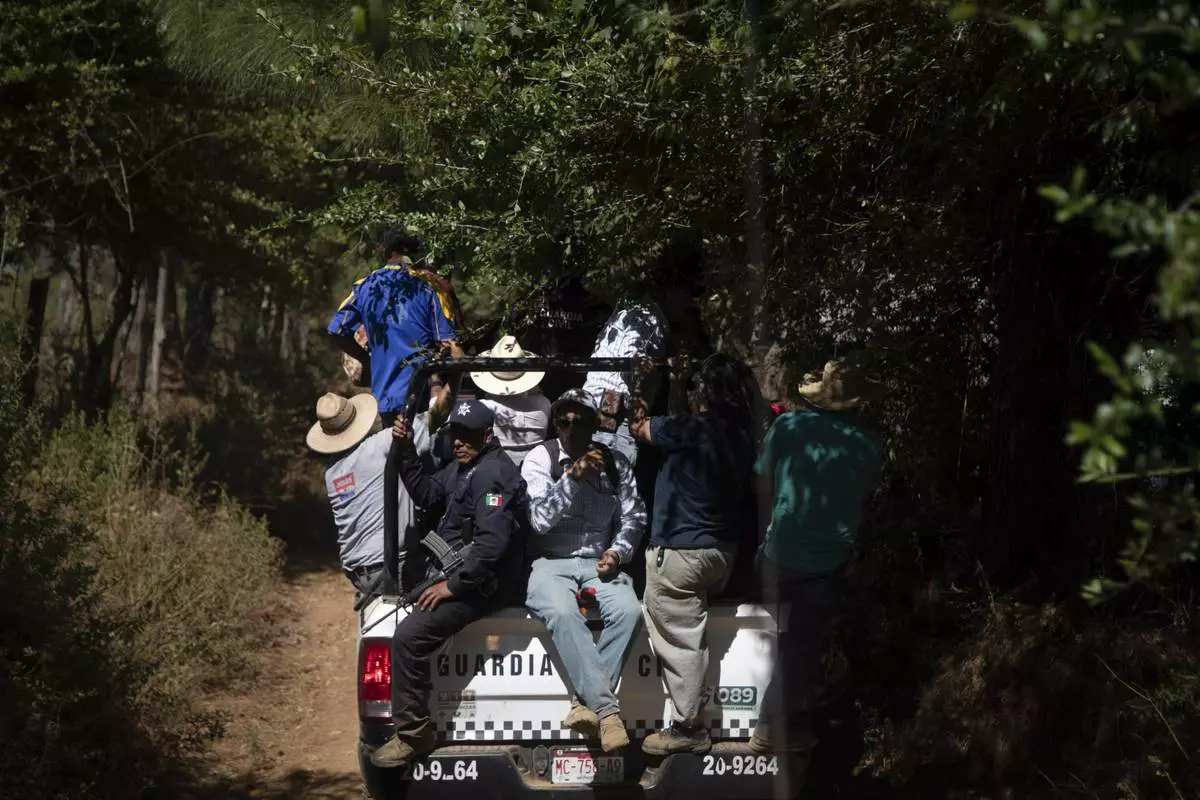
Locals ride in a National Guard truck in search of unlicensed water intakes and irrigation holding ponds that irrigate avocado and berry orchards during a drought in the mountains of Villa Madero, Mexico, Wednesday, April 17, 2024. Subsistence farmers and activists from the Michoacan town of Villa Madero organized teams to go into the mountains and rip out illegal water pumps and breach unlicensed irrigation holding ponds. (AP Photo/Armando Solis)
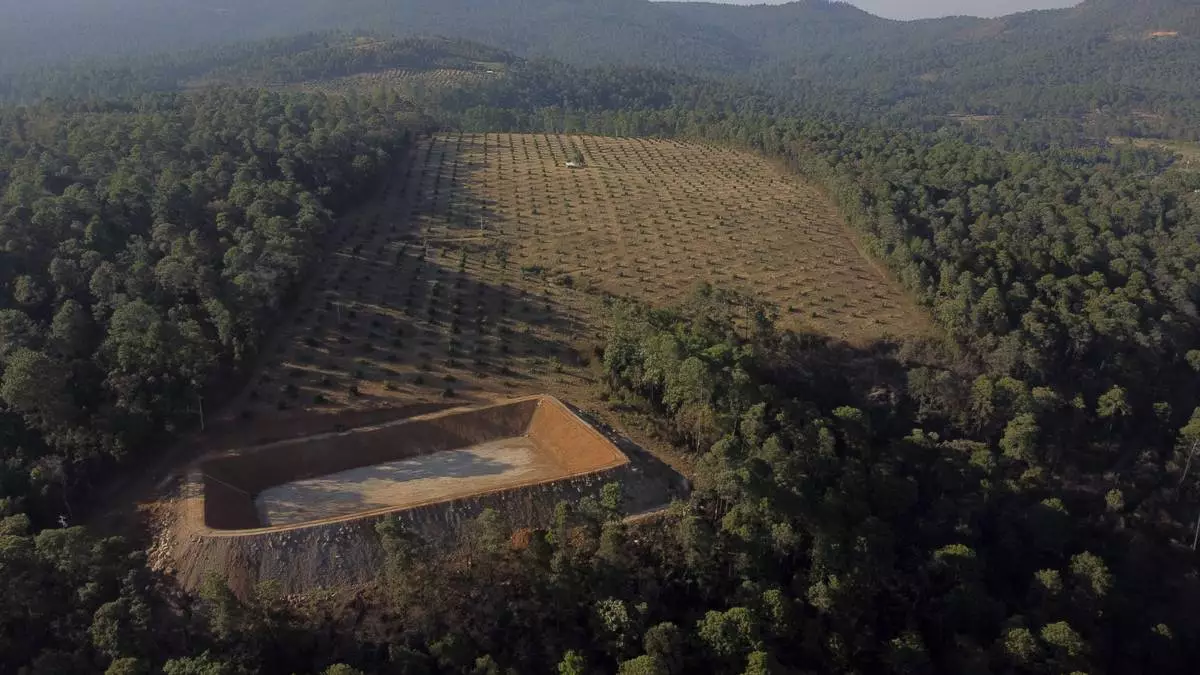
An unlicensed irrigation pond is under construction by an avocado orchard during a drought in the mountains of Villa Madero, Mexico, Wednesday, April 17, 2024. Farmers from Villa Madero who spotted the pond say they plan to meet with authorities to get the pond's owner to agree on a percentage of water usage, and if it fails, they plan to destroy it. (AP Photo/Armando Solis)
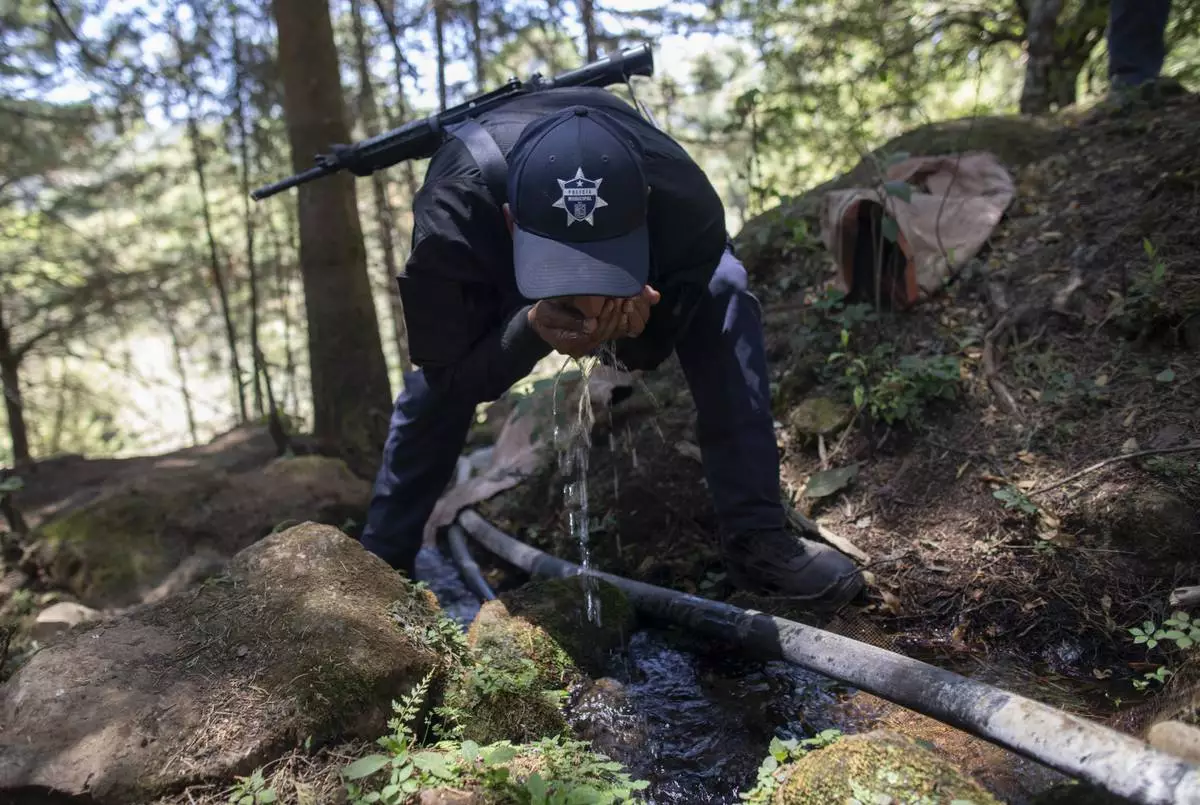
A municipal police officer drinks water from a stream lined with an unlicensed hose as he accompanies locals who are dismantling illegal water taps during a drought in the mountains of Villa Madero, Mexico, Wednesday, April 17, 2024. On Wednesday, dozens of residents, farmworkers and small-scale farmers from Villa Madero hiked up into the hills to tear out irrigation equipment using mountain springs to water avocado orchards carved out of the pine-covered hills. (AP Photo/Armando Solis)
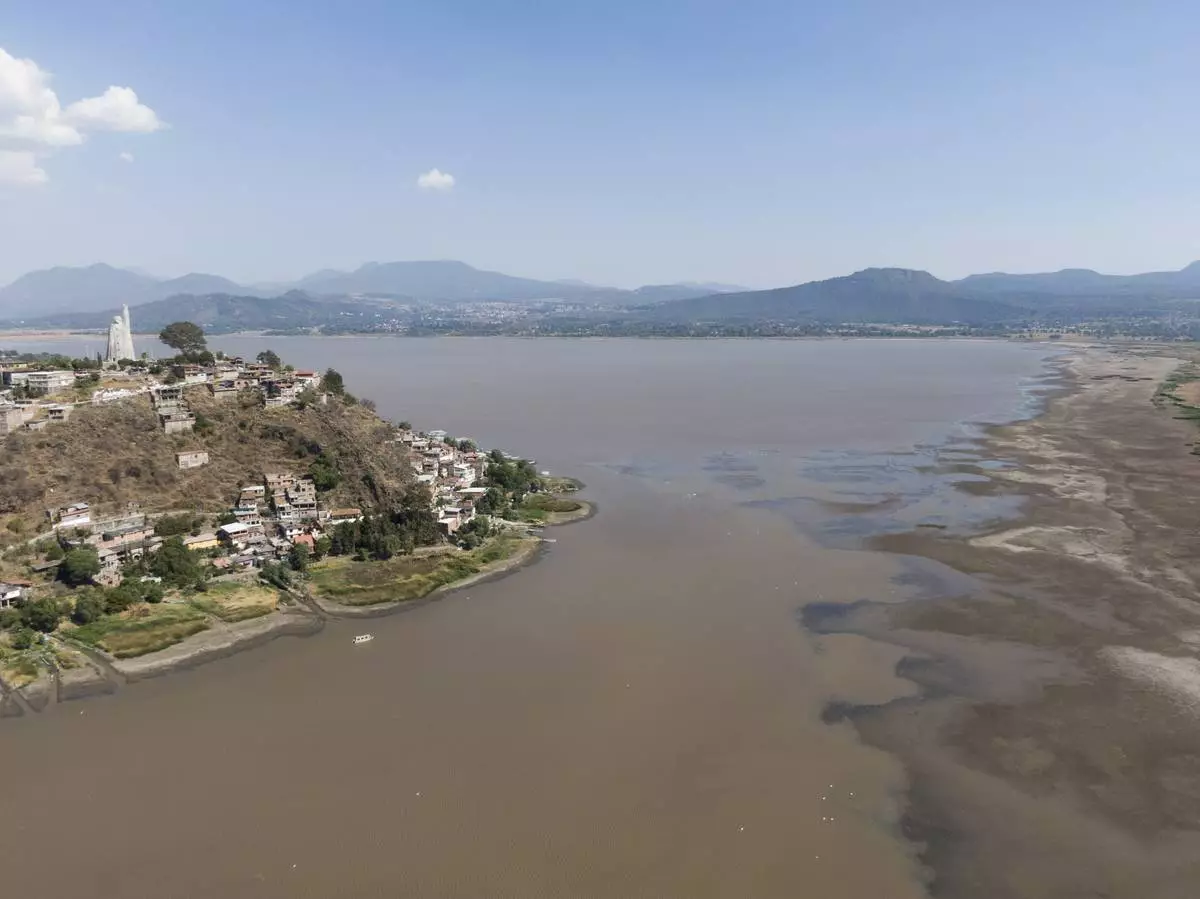
Janitzio Island stands in Lake Patzcuaro, which has low water levels during a drought in Mexico, Thursday, April 18, 2024. Farmers are starting to pasture livestock and plant crops on the lake bed. (AP Photo/Armando Solis)
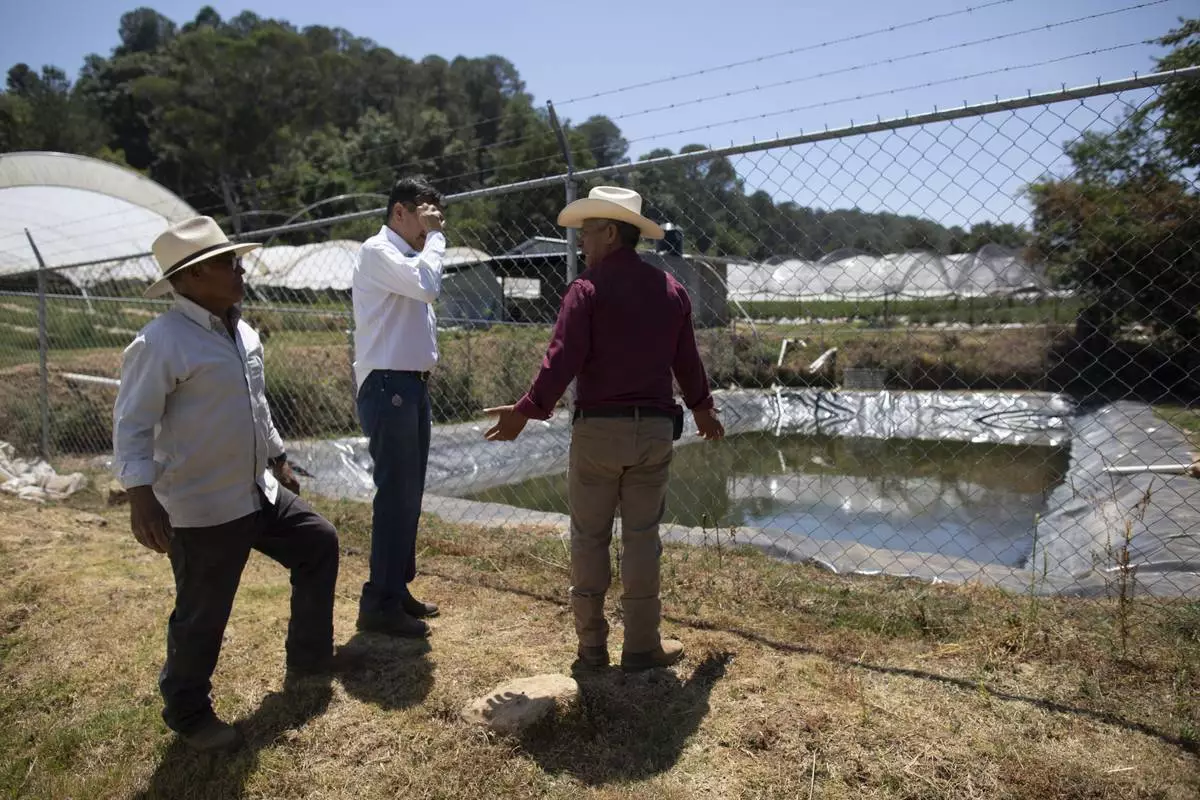
Residents of Villa Madero look at unlicensed irrigation holding ponds during a drought in the mountains of Villa Madero, Mexico, Wednesday, April 17, 2024. The group said they plan to meet with authorities to get the pond's owner to agree on a percentage of water usage, and if it fails, they plan to destroy it. (AP Photo/Armando Solis)
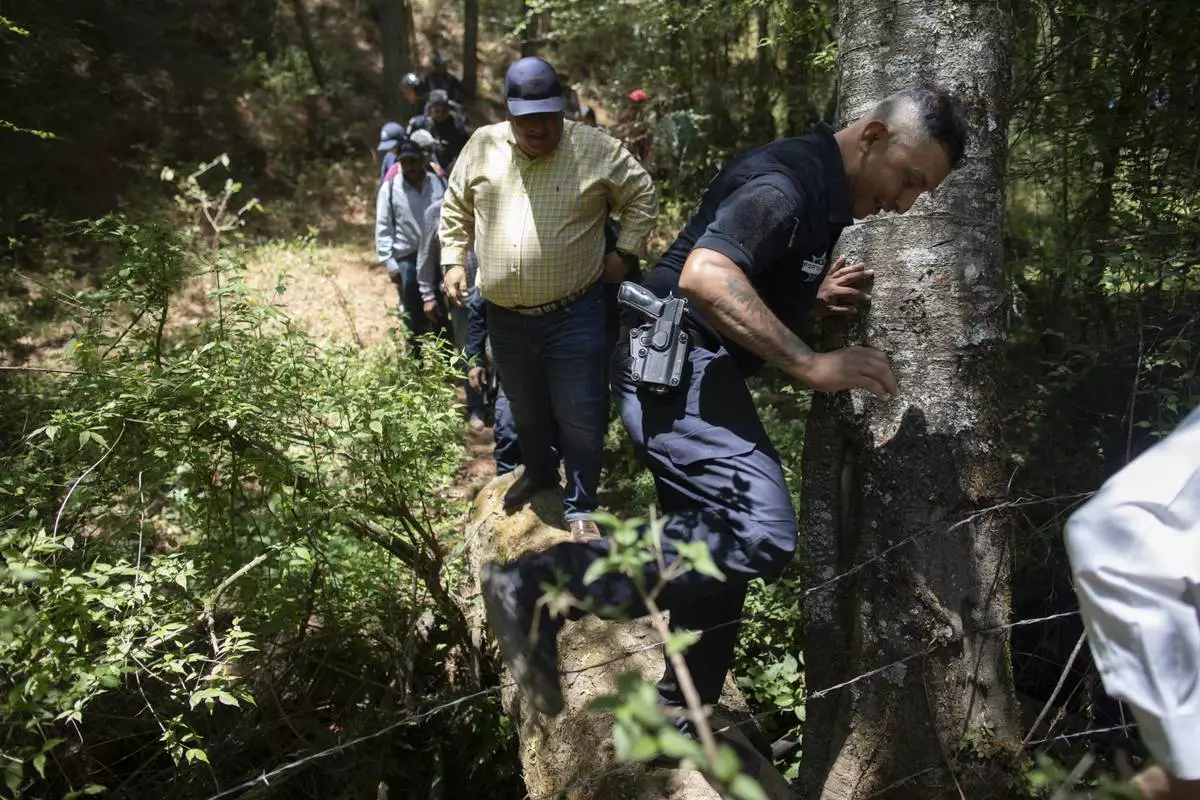
An armed police officer accompanies locals from Villa Madero through the mountains in search of unlicensed water intakes and irrigation ponds during a drought in Villa Madero, Mexico, Wednesday, April 17, 2024. Subsistence farmers and activists from the Michoacan town of Villa Madero organized teams to go into the mountains and rip out illegal water pumps and breach unlicensed irrigation holding ponds. (AP Photo/Armando Solis)
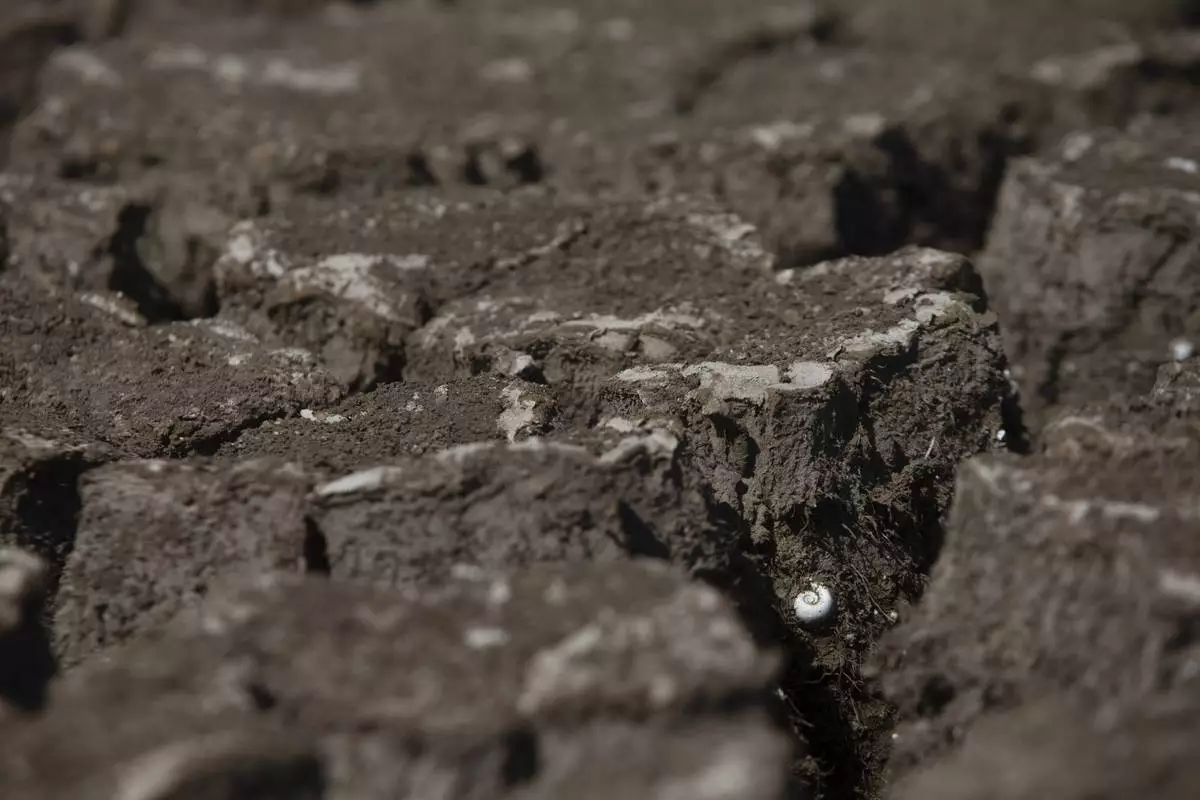
A snail lays in the dry bed of Lake Patzcuaro, during a drought in Mexico, Thursday, April 18, 2024. The lake has been reduced to about half its size, due to drought, deforestation, sediment buildup, and increased water demands from avocado and berry growers. (AP Photo/Armando Solis)

Boats are docked on the shore of Lake Patzcuaro, during a drought in Mexico, Thursday, April 18, 2024. Activist Juan Manuel Valenzuela estimates that 90% of the boats that used to fish and ferry tourists around are now out of service. (AP Photo/Armando Solis)
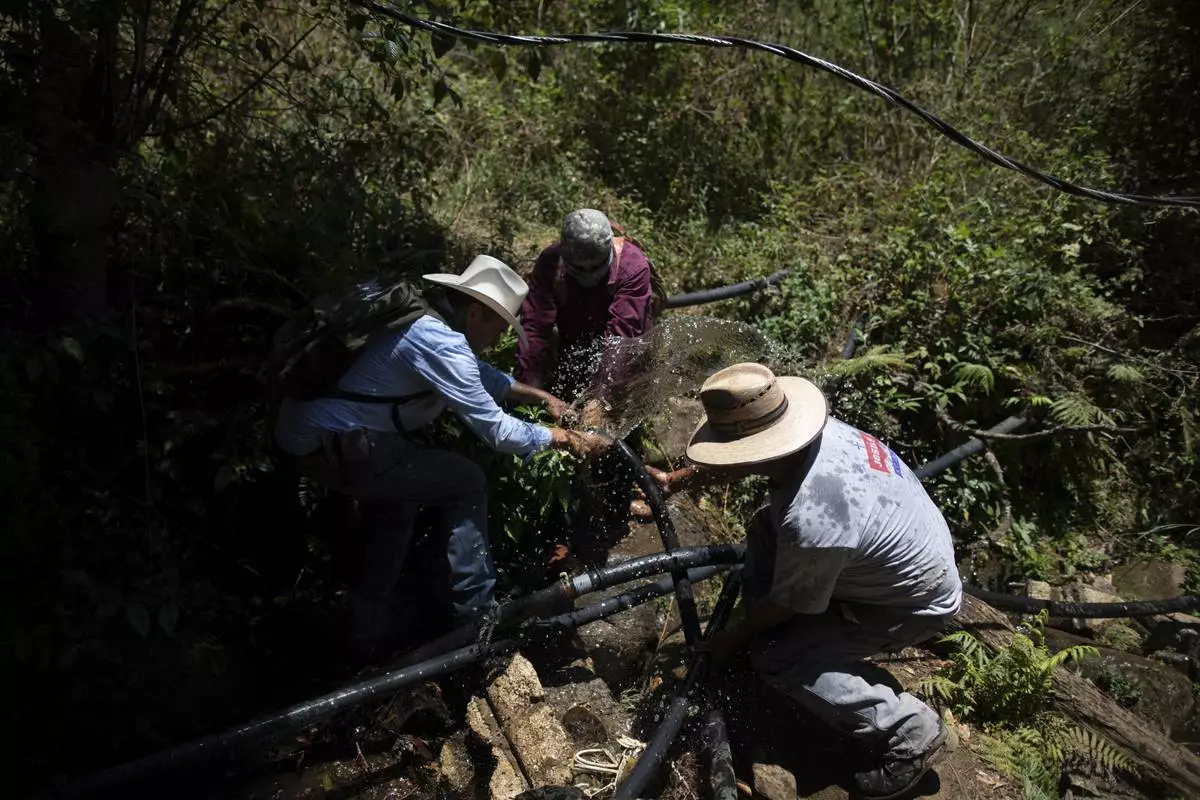
People dismantle an unlicensed water intake as their group of residents, farmworkers and small-scale farmers disconnect water taps in the mountains of Villa Madero, Mexico, Wednesday, April 17, 2024. As Mexico's drought drags on, angry farmers in Villa Madero have begun taking direct action to dismantle illegal water intakes which they say are drying up the streams in the mountains west of Mexico City. (AP Photo/Armando Solis)
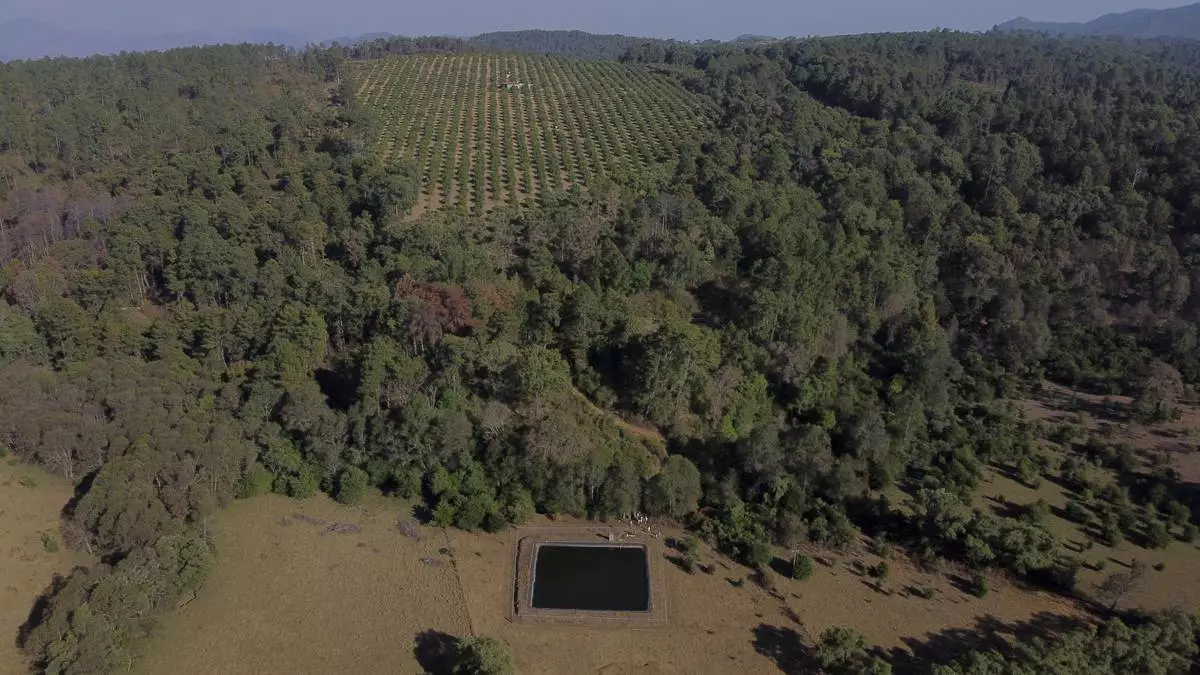
An unlicensed irrigation pond holds water near an avocado orchard in the mountains of Villa Madero during a drought in Mexico, Wednesday, April 17, 2024. Residents from Villa Madero who spotted the pond say they plan to meet with authorities to get the pond's owner to agree on a percentage of water usage, and if it fails, they plan to destroy it. (AP Photo/Armando Solis)
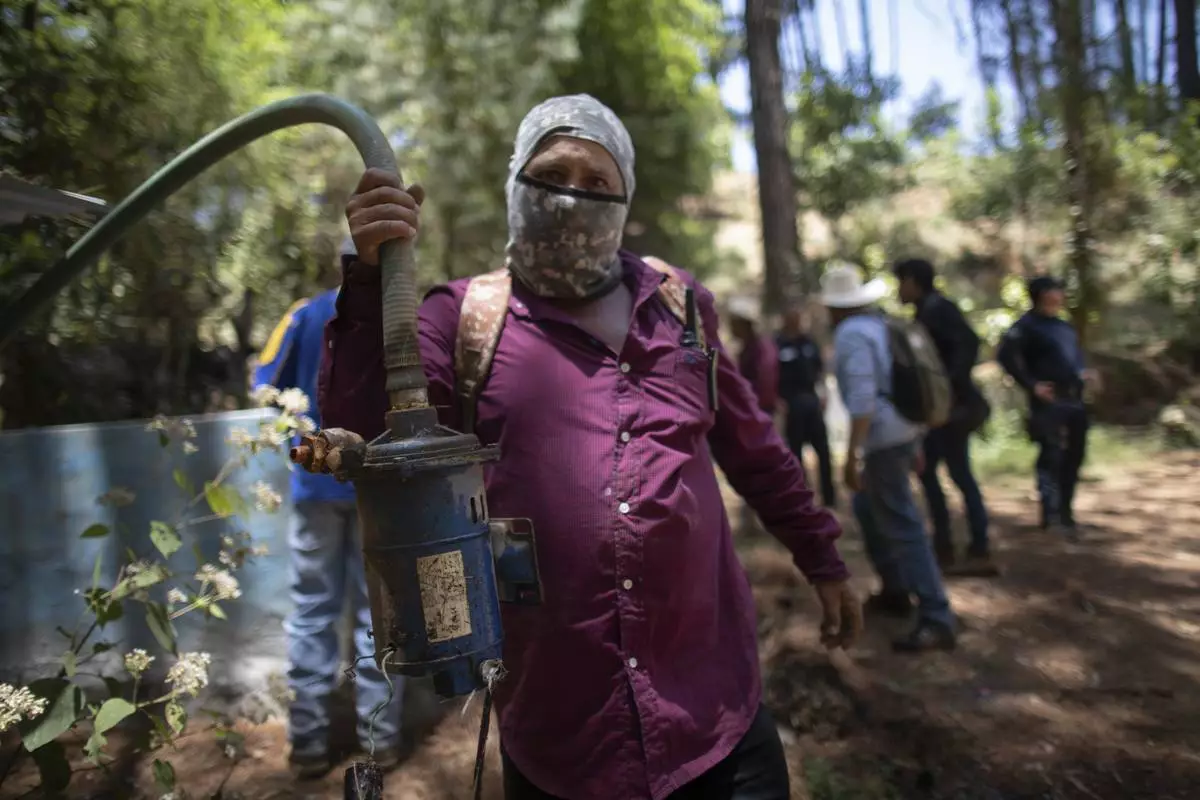
A man shows a pump removed from an unlicensed water intake as his group of residents, farmworkers and small-scale farmers from Villa Madero dismantle illegal water taps in the mountains of Villa Madero, Mexico, Wednesday, April 17, 2024. As a drought in Mexico drags on, angry subsistence farmers have begun taking direct action on thirsty avocado orchards and berry fields of commercial farms that are drying up streams in the mountains west of Mexico City. (AP Photo/Armando Solis)




















